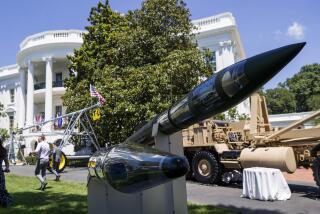Nigerian Troops Due in Liberia Next Week
- Share via
UNITED NATIONS — A long-awaited international intervention in Liberia finally lurched into motion Wednesday as Nigerian officials announced that their first battalion of peacekeepers would arrive in Monrovia on Tuesday and the United States introduced a resolution authorizing a limited multinational force to follow.
The moves break a stalemate between Washington and African leaders over who should take the first steps to stabilize the rebellion-torn West African country, and who should pay for it.
President Bush has ordered three ships in an Amphibious Ready Group carrying about 2,300 Marines and 2,000 sailors toward the coast of Liberia in a gesture of support. The Pentagon said Wednesday that two of the three ships would arrive by the weekend.
Washington has said it wants to see a clear commitment of peacekeepers from regional leaders before committing more money or any U.S. troops to the effort. Nigeria said it wouldn’t send vanguard troops until funding was guaranteed.
After reassurances from United Nations Secretary-General Kofi Annan that the world body and other nations would finance African troops acting at the U.N.’s behest, Nigerian President Olusegun Obasanjo told Annan on Wednesday that the first battalion could start moving immediately from Sierra Leone and would touch down in Liberia next week, said a U.N. official.
Another will follow from Nigeria soon after, and by late August about 1,500 soldiers should be on the ground, said Jacques Klein, the U.N.’s special envoy to Liberia.
“The question then is: Will that trigger the American response?” Klein said. “I think a lot of countries are willing to participate if they sense even a minimal U.S. presence.”
Responding to mounting international pressure to take the lead, the U.S. presented a draft resolution to approve a multinational force, including the Nigerians, to maintain a Liberian cease-fire until U.N. peacekeepers arrive.
But the resolution does not commit U.S. troops to direct participation in the force. And it contains two conditions limiting any U.S. involvement: that U.N. peacekeepers arrive by Oct. 1 to relieve the initial troops, and that members of both forces are not subject to prosecution by the International Criminal Court, or ICC.
The ICC exemption sparked more negotiations among Security Council members still resentful of Washington’s campaign for special exceptions from international law. But council diplomats began to work on language Wednesday to finesse their differences and have the measure ready for a vote by the end of the week.
The resolution would also allow the unusual step of using U.N. peacekeeping funds to subsidize African troops who are not U.N. peacekeepers -- a request made by Annan to reassure African leaders that they would not be stuck with the bill for an emergency deployment.
The Economic Community of West African States has estimated that it would cost $110 million to maintain 3,000 troops for six months in Liberia. The U.S. has offered $10 million in logistical support through a contract with Pacific Architects and Engineers, a military subcontractor that has worked in Sierra Leone. The remainder will be covered by the world body and donor nations, U.N. officials said.
In Liberia, a reconnaissance team of military experts began to assess what the two Nigerian battalions will need to enforce a shaky cease-fire agreement between rival rebel forces and the embattled government of Liberian President Charles Taylor.
The U.N. hopes that the arrival of the vanguard forces will trigger Taylor’s departure to exile in nearby Nigeria.
The multinational force will then come to help disarm the ragtag armies, supervise the installation of a new government and oversee the delivery of aid. A U.N. peacekeeping force would relieve the force by Oct. 1, according to the draft resolution.
In a news conference at U.N. headquarters, Annan said that although the operation was certainly not risk-free, the hardest thing may simply be getting started.
“This is one of those rare situations that even though the cease-fire has broken down, both sides genuinely seem to want the international force to come in -- not just the government and the rebels but also the population,” Annan said.
“My sense is that the risks that we are concerned about may not be as great as we think they are.”
More to Read
Sign up for Essential California
The most important California stories and recommendations in your inbox every morning.
You may occasionally receive promotional content from the Los Angeles Times.












